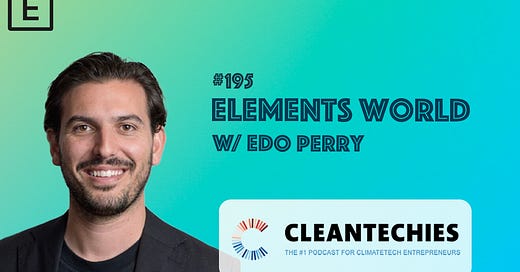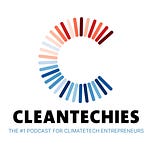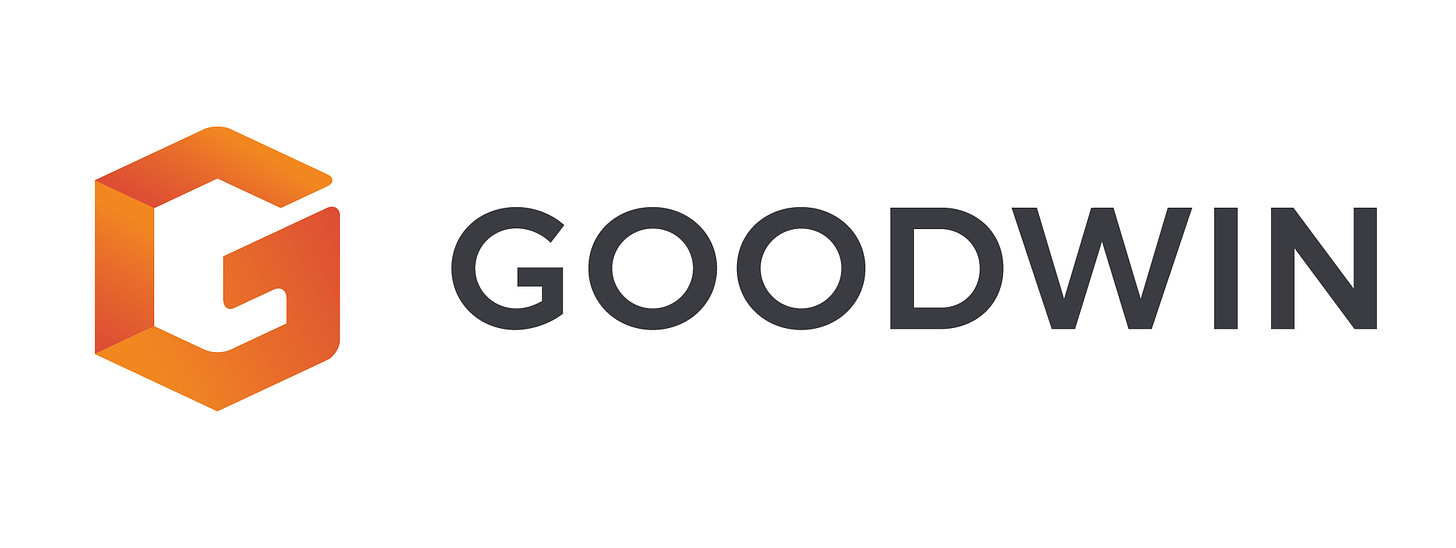How did the corporate giant announce their green initiative?
By sending out millions of paper flyers about saving the rainforest! 🔖
🌎 Welcome back to CleanTechies
We are The #1 Podcast For ClimateTech Entrepreneurs.
Convo’s (x2) with top climate entrepreneurs each week 🎙️
In-depth takeaways for each ep to distill the core lessons 🙋
Companies to watch lists weekly(ish) 📝
Monthly show with Somil & Silas 🤓
ClimateTech Investor? Entrepreneur? Maybe an aspiring one? Service provider?
If what you do touches early-stage ClimateTech, this is the place for you. 🤝
Too busy to listen? Check out the transcript below 👇 (if you’re reading in email, check out the full transcript by reading on Substack)
Today, we are talking to Edo Perry of Elements World.
Edo is a rockstar individual — from tackling the lack of green employer incentive problem to building climate tech communities across the USA, Edo joins us to share his journey from working in sustainability at Apple to founding Elements World, making it possible for employers to hit their sustainability targets through their employees.
He discusses the unique challenges and opportunities in addressing Scope 1, 2, and 3 emissions by leveraging the often-overlooked potential of employee-related activities, such as business travel, commuting, and work-from-home practices.
He breaks down:
Their shift from a B2C to a B2B model 📈
Shares insights on fundraising challenges 💰
The importance of gaining traction before approaching investors 💵
The role of AI in optimizing their offerings 🤖
Convinced that you should know more about this? Well, you’re in luck. Tune in to todays episode to learn more…🎧💡
📺 Watch on YouTube | 🍎 Apple Podcasts | 🎧 Spotify | 🗣️ Join the Slack Channel
Every ClimateTech Entrepreneur needs a reliable partner for their legal needs. Why settle for less than the best? 💪🏽
Reach out to Goodwin Law today; the law firm of choice for hundreds of ClimateTech Entrepreneurs worldwide. They have you covered from funding docs to offtake contracts to IPO and M&A support. GoodwinLaw.com (and tell them CleanTechies sent you!)
The Guest: Edo Perry
Edo Perry is the CEO and co-founder of Elements, optimizing corporate sustainability through employee engagement.
With over 12 years of experience in climate tech, Edo's background includes work with NGOs, political campaigns, and sustainability roles at Apple.
At Apple, Edo Perry worked on sustainability projects including waste management, energy efficiency, and employee engagement in sustainability initiatives.
Edo Perry organizes intimate climate tech events that foster cross-industry connections and community building for organizations like Voyagers and ClimateHack.
The Company: Elements World
One Liner: AI-powered tool that helps corporations optimize resources, cut operational costs, and reduce Scope 3 emissions from employee activities like business travel, commuting, and remote work
Elements World focuses on optimizing corporate sustainability through employee engagement.
The company aims to help organizations reduce carbon emissions by addressing employee-related activities such as business travel, commuting, and work-from-home practices.
Elements integrates into existing corporate systems to gather data and offers solutions like community solar and energy-efficient technologies to employees.
By creating a new standard of "climate benefits," Elements seeks to become an essential component of corporate sustainability strategies worldwide.
Got future guest suggestions or topics? Leave a comment!
Unable to support financially but still want to help? Share this post w/ 3 ClimateTech (or aspiring) entrepreneurs. Sharing is super helpful to us, and it costs you nothing.
📝 Show Notes:
Topics
02:31 Introduction and Background
05:23 Understanding the Employer Problem
09:16 Transition from B2C to B2B
13:13 Working at Apple and Decision to Found Elements World
16:43 Fundraising Journey
22:26 Using AI in Climate Tech
27:26 Building and Scaling the Team
33:06 Creating ClimateTech Communities
35:44 Future Goals and Closing Thoughts
Links
Connect with Somil on LinkedIn | Connect with Silas on LinkedIn
@Silas & @Somil_Agg on X
This podcast is NOT investment advice. Do your homework and due diligence before investing in anything discussed on this podcast.
Text Transcript 👇🏽
Somil Aggarwal:
Yeah, great, I'm super happy to have you on. I know who you are very well, but the audience doesn't, so please introduce yourself.
Edo Perry:
So I'm Edo, the CEO and co-founder of Elements. Born and raised in California, lived in Israel for the last 14 years. Recently moved to San Francisco, so I'm based currently in San Francisco. I've been in climate tech for the past 12 years, from NGOs to political campaigns to working at Apple on sustainability, to starting Elements in different communities. And that's pretty much it.
Somil Aggarwal:
Yeah, you're a huge community builder. Can't state that enough. And I'm gonna ask you a couple of questions about that before we get into it, but let's start off. We're gonna get into what Elements World does, but I think the coolest thing that you guys do is you try to tackle the employer problem. So just generally speaking, what is the employer problem?
Edo Perry:
I think that when companies today look at carbon emissions in general, and with all these new regulations coming out—like SB 253 in California, the CSRD in Europe, and the SEC's evolving standards—there's a lot of regulation that companies need to address. They've also put out these net-zero goals, and measuring all these emissions is very hard. Scope 1, 2, and 3 emissions are a very challenging area that companies need to face. We specifically focus on the employee side, which we see as an untapped area. If we can utilize that in the right way, we can create value for both companies and employees, helping them reach their net-zero goals much quicker and more effectively. That's what we focus on.
Somil Aggarwal:
It's very clear that employers have a lot of agency in determining the carbon footprint of their employees. The way you go about it is not immediately obvious, but there are inherent decisions that employers encourage that affect that. And that's exactly what you tackle, right?
Edo Perry:
Yep, that's exactly it. We try to optimize resources. Companies spend a lot on business travel, commuting, and work-from-home expenses. We can help reduce these expenses and operational costs while also reducing carbon emissions. So, there's a win-win on that side.
Somil Aggarwal:
Let's start basic. If I'm a big company, let's call it Orange, and I want to decarbonize and meet my decarbonization goals, how does Elements World help me do that? How do you engage with that kind of company?
Edo Perry:
That's a great question. Usually, we work with chief sustainability officers, sustainability teams, and also CFOs or COOs. We integrate into their existing tech stack, such as HR, business travel expenses, and commuting systems like Uber and Lyft. We gather data to have accurate and granular information on emissions. The second part of our solution is the reduction aspect. We help optimize and find the right solutions to reduce business travel, commuting, and work-from-home emissions. We offer solutions like community solar, heat pumps, and smart meters. For example, one of our providers is Arcadia. We can offer community solar to employees or energy-efficient technologies. That's what we do with different companies.
Somil Aggarwal:
When we first sat down to talk about Elements World, you walked me through how you guys found the employer model. It's not necessarily a straightforward model. Can you tell us about the experimentation that led you to targeting employers?
Edo Perry:
Yeah, that's a great question. We started out B2C, wanting to make renewable energy accessible for everyone. We wanted to find different solutions and educate people about the financial value of solar, heat pumps, etc. But B2C is really hard, and we didn't see the market moving in that direction quickly enough. So, we shifted to B2B, realizing that if we want to make a bigger impact, we should go through employers. For example, Apple has 164,000 employees, which means 164,000 homes we could potentially reach. Companies have regulations and sustainability teams, making them more educated about these issues. So, it made more sense to go through the B2B route.
Somil Aggarwal:
In terms of messaging, you were originally thinking about the consumer, but then switched to the employer. What were the major differences in the language and approach that you felt?
Edo Perry:
It had a lot to do with finance, showing returns. Companies introduce new software for three reasons: making money, saving money, or due to regulation. The B2B side focuses heavily on regulation and cost savings. So, we changed our vocabulary to match their needs.
Somil Aggarwal:
You mentioned Orange as a big competitor to Apple a couple of times now. I think it's an especially potent example here because you used to work for Apple. Before we dive into that, I want to get a little bit of your journey. You were working within sustainability at Apple and decided to leave and start your own company. What was the decision to do that like? You're leaving what's presumably a relatively secure and cushy job, right?
Edo Perry:
That's true, and it was not easy. But, at some point, I felt that as much as I enjoyed the work there, Apple's focus on consumer electronics didn't align with my passion for sustainability. I thought I could make a much bigger impact outside Apple. I left on good terms and continued as a consultant for them. We've even worked with them through Elements. It just felt like the right decision to make.
Somil Aggarwal:
What were the biggest takeaways from your experience at Apple? Walk me through what it was like working in sustainability there and what you learned.
Edo Perry:
I was in Israel, working in R&D, and was the first to focus on sustainability and climate there. I handled projects around waste management, water, energy management, employee engagement, and getting buildings to LEED Platinum or Gold standards. Apple’s approach to sustainability and climate investment is incredible. Working with incredible people and seeing how they prioritize these issues was a big takeaway. Companies like Google and Microsoft are also good examples, but there are only a few companies doing this at such a scale.
Somil Aggarwal:
Definitely makes sense. So, you're a founder who's recently started this company. Would you consider yourself a first-time founder?
Edo Perry:
For sure. Yep, first-time founder.
Somil Aggarwal:
What was that experience like? Especially since your business model isn't hardware-heavy, how do you become a connective player in the ecosystem?
Edo Perry:
It's very early, and I like to say it's a first-mover's market. There are quite a few players in Europe, less in the US. We defined a term called "climate benefit for employees," similar to health benefits or pension funds. It's a new term that requires market education, and we haven't seen too many folks doing that. We aim to create a new standard in every company worldwide.
Somil Aggarwal:
There's a lot of white space for that. You've seen companies like Carbon Collective focus on bringing sustainability to 401ks. It doesn't feel like an employee's responsibility to figure that out. By engaging with employers, you remove a huge hassle.
Edo Perry:
For sure. Brean is a great example of a company we partner with. We try to offer their green 401k plans to employees of our clients. There's a lot of synchronicity in that space.
Somil Aggarwal:
What was it like fundraising for Elements? Fundraising is one of the hardest things a first-time founder faces.
Edo Perry:
It was not easy. As a first-time founder in a down market, it was one of the hardest challenges. We decided to bootstrap the company initially. I personally invested, and we had some family and friends help out. We focused on getting early traction and design partners, which our investors wanted to see. Once we had those big logos, like Lemonade, Estee Lauder, and Apple, investors took us more seriously. We eventually closed a pre-seed round with Fusion VC and other investors.
Somil Aggarwal:
That's incredible. What stood out to investors when you bootstrapped and then approached them with progress? What would you do differently next time?
Edo Perry:
Traction was key. Once we had large companies working with us, it showed investors we were serious. I recommend focusing on clients early on and getting substantial traction before meeting investors. We spent too much time meeting investors early without enough traction. Also, focus on the MVP and understanding company needs before building out many features.
…Tune into the episode for the rest 🎧💡


















Share this post